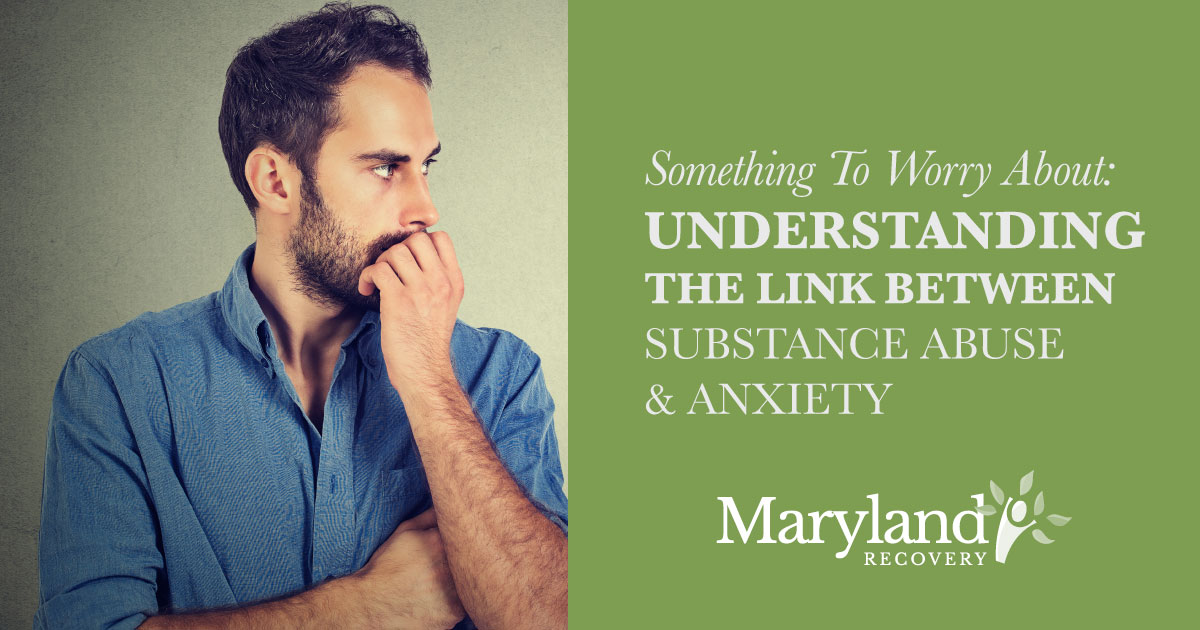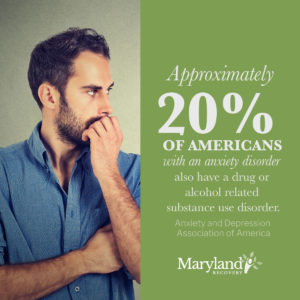 Did you know that roughly 18 percent of Americans suffer from some type of anxiety disorder? Some of the most common versions of this illness include acute stress disorder, generalized anxiety disorder, panic disorder and stress or anxiety related phobias.
Did you know that roughly 18 percent of Americans suffer from some type of anxiety disorder? Some of the most common versions of this illness include acute stress disorder, generalized anxiety disorder, panic disorder and stress or anxiety related phobias.
It is estimated that only a third of individuals struggling with anxiety actually seek medical attention for their disorders. The means that the other two-thirds are in need of serious help. They are also at a high risk for developing co-occurring anxiety and substance abuse problems.
Here at Maryland Recovery, we think it is important to understand the relationship between anxiety and substance abuse. Knowledge is the first step in avoiding this deadly cycle.
Which Comes First? The Cause and Effect
When it comes to treating patients with both anxiety and substance abuse disorders, even trained professionals have difficulty determining which disorder manifested first in each patient. Co-occurring disorders seem to affect the body simultaneously, leading to patients experiencing a vicious cycle of anxiety and substance abuse.
In fact, 20 percent of people with an anxiety disorder are also addicted to drugs or alcohol. The addiction rate is even higher for anxiety patients than for other high-risk groups, such as combat veterans, rape victims and victims of other traumatic events.
Anxiety and substance abuse co-exist in a few different ways. In each scenario, there is a different starting off point, eventually leading to the same, dangerous result. Examples of these unfortunate scenarios include:
Anxiety Disorder Occurs First
In this scenario, someone develops an anxiety disorder. Instead of seeking medical attention, they begin to self-medicate with drugs or alcohol. In the early stages, they may not even realize a disorder is developing – they only know that some substances ease their feelings of anxiety.
Substance Abuse Disorder Occurs First
This scenario occurs when someone is dependent on alcohol or drugs, and then develops an anxiety disorder. The individual’s anxiety usually stems from withdrawal or other dependency issues, usually related to alcohol. Left untreated, the chronic anxiety can develop into a full-blown disorder.
Co-Occurring Anxiety and Addiction
In the third scenario, addiction and anxiety do not develop in a cause-and-effect relationship. The person just happens to develop disorders both at the same time. This is the least likely of the scenarios as mental disorders tend to directly interact, but it isn’t impossible.
The Complex Relationship Between Anxiety and Substance Abuse
 The sad reality is that people commonly use drug (typically alcohol) as a means to dull or numb their anxiety. Unfortunately, alcohol only makes the anxiety worse.
The sad reality is that people commonly use drug (typically alcohol) as a means to dull or numb their anxiety. Unfortunately, alcohol only makes the anxiety worse.
Though the first drink may give individuals the illusion of peace, eventually the effects of the alcohol wear off and their anxiety is intensified.
This cycle may encourage someone to drink even more, which would in turn cause even more anxiety. Alcohol isn’t the only substance that causes issues for those suffering from anxiety, but it is easily the most accessible.
Along with alcohol, here are some other problematic self-medicating scenarios:
Alcohol-Induced Anxiety
Alcohol-induced anxiety is slightly different than someone using alcohol to dull their anxiety symptoms. When substance-induced anxiety begins, it will usually only last as long as it takes the alcohol to leave the person’s system. If the induced anxiety begins during withdrawal, symptoms can continue as far as four weeks after the substance is no longer being used.
The good news about this type of anxiety is that it typically fades away once the alcohol is flushed from a user’s system. Depending on the duration of abuse, withdrawal anxiety can last much longer. Some recovering alcoholics have experienced anxiety-related issues that lasted three months into their sobriety. With time, however, withdrawal symptoms will wane and afford the person some real relief.
Opioids and Anxiety
Non-medical opioids are frequently used as a way to self-medicate and numb the pain and stress of anxiety. Studies have shown that more and more people with mood disorders are abusing opioids to elevate their mood and manage their symptoms. Much like alcohol, the research has shown extended use of opioids can manifest or worsen mood disorders like anxiety.
Treatment Plans
As those suffering from addiction go through recovery, it is important to determine how their substance abuse problems are interacting with their anxiety disorders. Once this relationship is diagnosed, skilled treatment counselors at can develop a recovery plan that works for each individual.
At Maryland Recovery, most treatments focus on recovery from addiction and anxiety without the need for medication. Psychotherapy is used to ease anxiety symptoms, allowing people to feel comfortable again without taking more drugs.
Overcoming addiction and an anxiety disorder will require a combination of treatments and a wealth of knowledge. Explore more of our website to learn more about mental disorders and why Maryland Recovery is the perfect place for you to start recovery.
Reviewed by Christopher Schwartfigure MS, LGPC, CAC-AD








